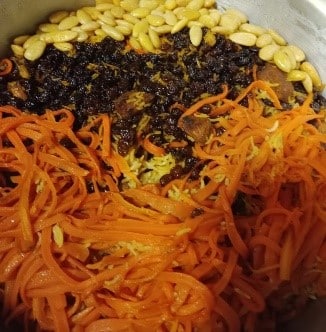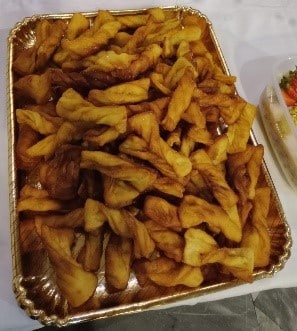Dreams
Fiona Kendall serves with Mediterranean Hope, Italy.

An invitation to dinner at 8.00 P.M. Nothing unusual about that – except that this was an invitation to an Afghan dinner taking place in an Italian Methodist church hall at which all of the food would be cooked by people who, having fled their country of origin, have arrived in Italy over the last eight months thanks to the humanitarian corridors program managed by the Federation of Protestant Churches in Italy (FCEI).
It was an evening not to be missed. The beautifully-cooked Afghan dishes were a sensorial delight. Sharing food is often an opportunity to share in another culture but this sharing was particularly special, for time was set aside after the meal to hear the stories of some of those who had so generously prepared and served the food, stories of people whose lives had been in danger less than one year ago.

The four young women who spoke were eloquent and composed. All currently learning Italian, they chose to tell their stories in near-perfect English, each opening a window onto a new aspect of the tragedy they shared. Two were athletes, whose skills on the cycling track and the football field heightened the vulnerability they experienced as women when the Taliban came to power. They spoke of the terror they felt as they crossed the border into Pakistan, unaccompanied women with only burkhas for protection, depending on the kindness of strangers, with no idea of their final destination. A third, only eighteen, spoke of the fear “to her bones” that she had felt about losing a member of her family and how that now inspires her to speak out, against the regime which puts lives at risk, and in gratitude to those governments and organizations prepared to facilitate a new start for them.

The theme of dreams cut across each of the stories we heard: dreams harbored; dreams smothered; dreams of women caged by their confinement to their homes; responsibility for the dreams of others carried with them to foreign lands; and the possibility, now, to dream again for themselves.
It was humbling to hear one say how, since she had come to Italy, she had heard of the people who try to make their way here by crossing the Mediterranean Sea, at extreme risk to their own lives. “We,” she said, “have had the simple route, coming via humanitarian corridors. How grateful we are.” For her to describe her own perilous journey, which had entailed mortal danger as her family crossed the border into Pakistan, as “the simple route” was profoundly moving. It is something that many politicians might wish to consider as they scramble to criminalize those who have no access to “simple routes” and to cut off the possibility of claiming asylum for those who, in desperation, try to find another.

Here in Italy, anti-migration rhetoric says that no one should leave their country for another in a small boat. As FCEI President, Rev Prof Daniele Garrone said in his remarks of welcome, what we should instead be saying is that no one should have to leave their country for another in a small boat; that we should instead be questioning what it is that drives them to do so. How exactly are we going to tackle that?
In amongst the joy of shared food, laughter and song, mutual enrichment, and genuine warmth nestles the disturbing truth that those sharing the meal are amongst a lucky few. Is it too much too long for society to share the dream – to dare to dream – of a welcome for all, however, they arrive?
Fiona Kendall serves with Mediterranean Hope, Italy. Her appointment is made possible by your gifts to Disciples Mission Fund, Our Church’s Wider Mission, and your special gifts.
